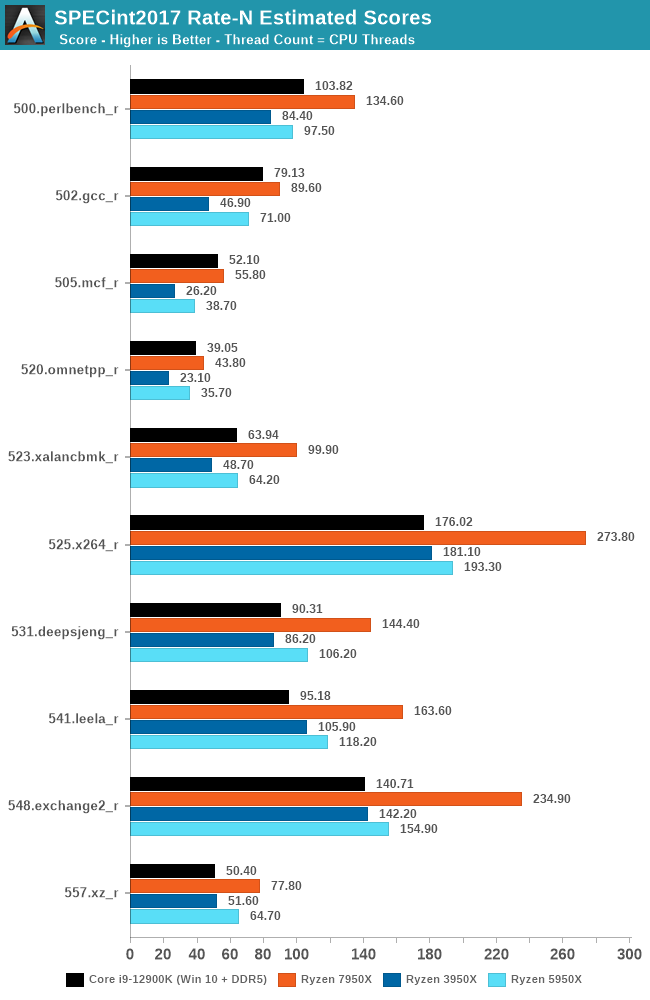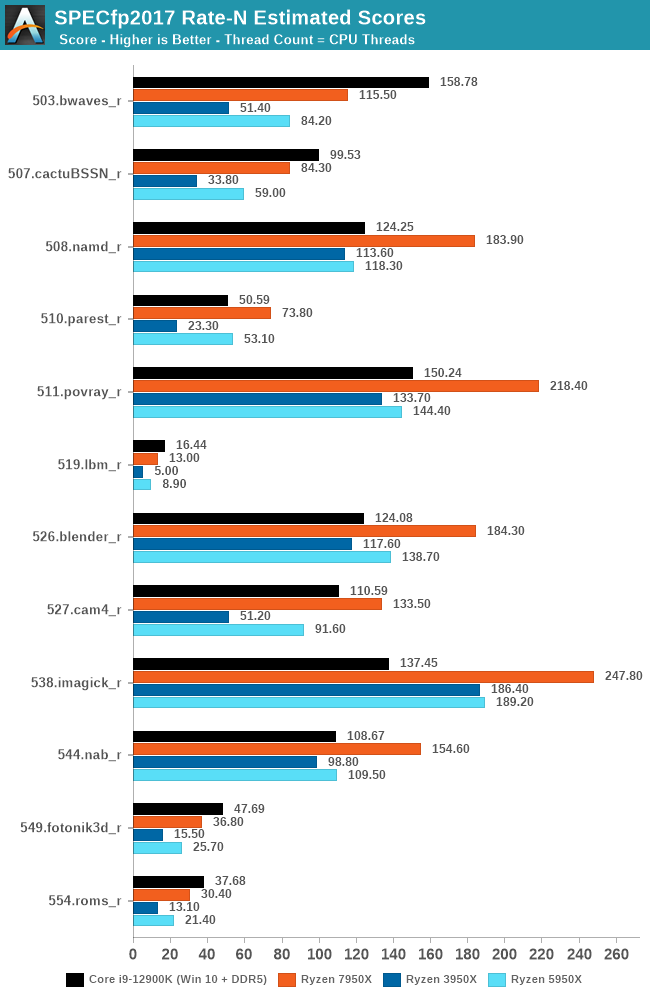AMD Zen 4 Ryzen 9 7950X and Ryzen 5 7600X Review: Retaking The High-End
by Ryan Smith & Gavin Bonshor on September 26, 2022 9:00 AM ESTSPEC2017 Multi-Threaded Results
Although single-threaded performance is important and Zen 4 has a clear advantage here, multi-threaded performance is also very important. Some variables to consider when evaluating multi-threaded performance is that desktop processor designs typically boost a single core higher, with the rest lagging in frequency behind to either stay under the thermal (TJMax) or power (TDP) envelopes. Some manufacturing processes are more efficient by design due to extensive R+D and product management, with Zen 4 looking to be much more in terms of perf per watt over Intel's Alder Lake architecture.
In the instance of the AMD Ryzen 9 7950X, it has a clear advantage over its predecessors in that it not only has a higher single core boost (5.7 GHz versus 4.9 GHz), but it also has a higher TDP than the Ryzen 9 5950X (170 W versus 105 W. This increase in TDP not only allows for a higher frequency, but it allows for a higher frequency spread across all of the cores when under full load.

Opening up our look at our SPECint2017 NT results, and we see a similar uplift in performance gains as we did in the single-threaded tests. In tests such as 500.perlbench_r, the Ryzen 9 7950 is 38% ahead of AMD's previous generation Ryzen 9 5950X, which is impressive. In 523_.xalanbmk_r, the Ryzen 9 7950 is 55% ahead of the Ryzen 9 5950X, and over 100% better in performance over the Zen 2-based Ryzen 9 3950X.

In our SPECfp2017 NT testing, certain workloads such as in 538.imagick_r showed massive increases in performance over previous generations, with a 30% uplift in performance over Zen 3. The difference here between Zen 3 and Zen 2 was marginal (10%), but Zen 4 is a more efficient core architectural design, with many improvements across the board playing a hand here; the switch to DDR5 versus DDR4, more cache per core, higher frequency, higher TDP, etc.
Overall AMD's Zen 4 architectural differences and improvements show that not only does AMD have the crown for single-threaded performance, but it's also ahead in multi-threaded performance too, at least from our SPEC2017 testing. As always when Intel or AMD makes a claim on IPC performance increases, AMD seems to be about right with claims of around 29% in ST performance and even more so in MT performance.










205 Comments
View All Comments
RomanPixel - Tuesday, September 27, 2022 - link
Me too! Replykmalyugin - Monday, September 26, 2022 - link
Wow, this article is almost unreadable. Was spellchecker turned off? Replyjonkullberg - Monday, September 26, 2022 - link
Gaming benchmarks with DDR5-6000 CL30 please! ReplyBushLin - Monday, September 26, 2022 - link
Exactly Replyxol - Monday, September 26, 2022 - link
wtf am I reading (context a part with tdp up to 170W from 105W) :"This has been possible through superior power efficiency, as Zencally a Zen 3 refinement, but on the new TSMC 5 nm process node (from TSMC 7 nm). This efficiency has allowed AMD to increase the overall TDP to 170 W from the previous 105 W but without too much penalty."
I can't even .. "too much penalty" ??
.. Looks like Zen has reached the end of the road imo (it had a good run) - none of the improvements here are from AMD - new DDR5, new 5nm node. The rest is "increase clocks/tdp" just like when Intel was stuck on 14nm.
I just don't know where they are going from here Reply
Threska - Monday, September 26, 2022 - link
Well we have " While Ryzen 7000 can drive a 2 DPC/4 DIMM setup, you’re going to lose 31% of your memory bandwidth if you go that route. So for peak performance, it’ll be best to treat Ryzen 7000 as a 1 DPC platform." and " Unfortunately, the compatibility situation is essentially unchanged from the AM4 platform, which is to say that while the CPU supports ECC memory, it’s going to be up to motherboard manufacturers to properly validate it against their boards.". The memory situation seems like a sticking point for a good while till things mature. ReplyBushLin - Monday, September 26, 2022 - link
Did you read the article? Put it in eco mode (105W for a 170W part) and it still stomps over everything in MT performance. Zen 4 is more about platform improvements, Zen 5 will be the microarchitecture overhaul. ReplyBushLin - Monday, September 26, 2022 - link
Stomping everything at 65W even! Replyxol - Tuesday, September 27, 2022 - link
Impressed that it's nominally $100 cheaper than a 5950X .Got to admit that. Replyxol - Tuesday, September 27, 2022 - link
Eco mode does perform better eg cinebench- b maybe +23% compared to 5950X, but it's using DDR5 5200 vs DDR4-3200 (?), and the power advantage can be assumed to come from 5nmMy original point still stands for me- 90% of benefits are from node and memory and allowing clocks as high as Tjunction allows - I don't think that is a great showing for AMD Reply